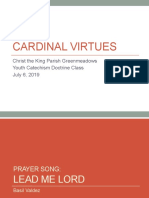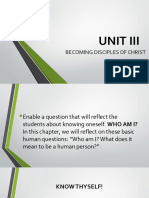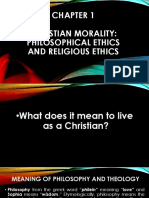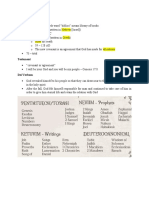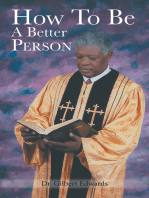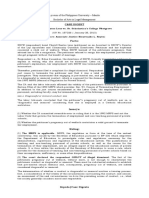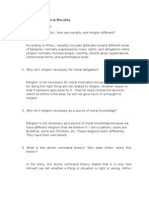0 ratings0% found this document useful (0 votes)
65 viewsRelationship Between Morality and Religion
Relationship Between Morality and Religion
Uploaded by
Alyssa RamosThis document discusses the relationship between religion and morality from three perspectives:
1) Morality depends on religion, with moral codes derived from sacred texts and religious authorities. However, some argue this makes morality dependent on God's commands rather than an independent concept.
2) Morality is independent of religion, with right and wrong determined by human reason rather than religious doctrine.
3) Some like Nietzsche and Dawkins see religion as opposed to morality, arguing it induces irrationality and holds humanity back from fulfilling its potential. The document examines various thinkers' views on how morality relates to belief in God.
Copyright:
© All Rights Reserved
Available Formats
Download as PPTX, PDF, TXT or read online from Scribd
Relationship Between Morality and Religion
Relationship Between Morality and Religion
Uploaded by
Alyssa Ramos0 ratings0% found this document useful (0 votes)
65 views21 pagesThis document discusses the relationship between religion and morality from three perspectives:
1) Morality depends on religion, with moral codes derived from sacred texts and religious authorities. However, some argue this makes morality dependent on God's commands rather than an independent concept.
2) Morality is independent of religion, with right and wrong determined by human reason rather than religious doctrine.
3) Some like Nietzsche and Dawkins see religion as opposed to morality, arguing it induces irrationality and holds humanity back from fulfilling its potential. The document examines various thinkers' views on how morality relates to belief in God.
Original Title
Relationship between Morality and Religion-.pptx
Copyright
© © All Rights Reserved
Available Formats
PPTX, PDF, TXT or read online from Scribd
Share this document
Did you find this document useful?
Is this content inappropriate?
This document discusses the relationship between religion and morality from three perspectives:
1) Morality depends on religion, with moral codes derived from sacred texts and religious authorities. However, some argue this makes morality dependent on God's commands rather than an independent concept.
2) Morality is independent of religion, with right and wrong determined by human reason rather than religious doctrine.
3) Some like Nietzsche and Dawkins see religion as opposed to morality, arguing it induces irrationality and holds humanity back from fulfilling its potential. The document examines various thinkers' views on how morality relates to belief in God.
Copyright:
© All Rights Reserved
Available Formats
Download as PPTX, PDF, TXT or read online from Scribd
Download as pptx, pdf, or txt
0 ratings0% found this document useful (0 votes)
65 views21 pagesRelationship Between Morality and Religion
Relationship Between Morality and Religion
Uploaded by
Alyssa RamosThis document discusses the relationship between religion and morality from three perspectives:
1) Morality depends on religion, with moral codes derived from sacred texts and religious authorities. However, some argue this makes morality dependent on God's commands rather than an independent concept.
2) Morality is independent of religion, with right and wrong determined by human reason rather than religious doctrine.
3) Some like Nietzsche and Dawkins see religion as opposed to morality, arguing it induces irrationality and holds humanity back from fulfilling its potential. The document examines various thinkers' views on how morality relates to belief in God.
Copyright:
© All Rights Reserved
Available Formats
Download as PPTX, PDF, TXT or read online from Scribd
Download as pptx, pdf, or txt
You are on page 1of 21
The Relationship Between
Religion and Morality
Are Religion and Morality
Connected?
• Ethical obligations, duties or requirements
presuppose an authority behind them – What is
the source of authority – God?
• Religious believers argue punishment will be
dealt out to wrong doers in the afterlife, if not in
this worldly life – Eschatological justice.
• However, existentialists may argue without God
morality is meaningless and ‘everything is
permitted’. If this is true God is the guardian of
morality. Without God moral chaos or anarchy
would ensue.
Relationship between Religion and
Morality – 3 Views
1. Depends on religion
2. Independent of religion
3. Opposed to religion
1. Depends on religion
• Moral codes are derived from religion.
• Moral opinions judged against religious
teachings.
• Authority of God, teachings from
sacred
texts, leaders and tradition – sources of religious
authority.
• Even secular society adopts or is influenced by
religious moral teachings ie Seeks guidance
from religious leaders in moral matters eg
Genetic Engineering/abortion.
• Suggests there is some connection.
Religious leaders
• Expected to have extremely high
standards of morality.
• Exposed and condemned by media when
falling short of morally high standards.
DCT (cont’d)
• Obedience is commanded.
• Punishment and the hope of reward are
the reason that it is ‘good’ to obey
Gods commands.
Divine Command Theory
• Sacred texts – Exodus in the Old Testament ie
The 10 Commandments (decalogue).
• Gods will alone decides what is right and
wrong
• Human reason has no authority.
• Gods authority is absolute.
• All humans can do is accept Gods authority and
respond either rightly or wrongly.
• Sin is disobedience to the word of God.
Problems
• Humans obeying Gods moral law out of fear of
punishment are acting out of self preservation or
hope of reward, rather than because it is moral
• Kant argued this should not be the motivation for
moral goodness.
• Also - if ‘morally good’ means ‘what God has
commanded’ we end up with a circular and trivial
claim.
• Eg What God commands is what God
commands and there is no separate or distinct
character (substance) to morality that
humans can recognise.
Furthermore
• If divine commands come from a transcendental
supremely powerful being – how can humans
even conceive of being able to assess whether it
is morally good or not.
• Worship becomes passive and no relationship
with God.
• If obedience to DCT is rewarded in the afterlife –
what about the inequality of godly people in this
life?
Aquinas and Kant’s views on
the relationship between
religion and morality
Aquinas
• Aquinas arguments for God based
on Plato’s eternal forms.
• Goodness found in human beings in this
contingent world are reflections of the
supreme goodness of God.
• Goodness on earth reflects Gods morally
good perfection.
• Beings in this life reflect different levels of
this moral goodness.
Kant
• For morality and its goal the Summom Bonum to
be meaningful, God must be a necessary
postulate of morality.
• The Summum Bonum is not achievable in this
life, therefore the existence of God is necessary
for the goal of morality to be realised.
• There has to be a ‘holy author’ of the world who
makes possible the ‘highest good’.
• Reason dictates that morality demands his
existence.
Conscience
• God given or the ‘voice of God’
• ‘the inner aspect of the life of an individual where a sense
of what is right and wrong is developed’
• Joseph Butler – conscience directs us to live
harmoniously with our competing drives of concern for
self and concern for others
• J. H. Newman – conscience reveals to us a higher
authority than any natural one, so therefore it must have
a supernatural origin of ultimate moral goodness.
• Feelings of guilt, shame, remorse are all testament to the
idea that there must be a higher power to which we
relate these feelings to.
Criticisms
• Freud – the conscience is a moral policeman –
the internalised ‘super ego’ that controlled and
socialised human moral behaviour. Capable
of doing much damage to our mental health.
• The ‘super ego’ keeps the ‘id’ in check and is the
result of upbringing and environment.
• Conscience frustrates genuine moral
development and leads to universal neurosis
Social conditioning
• Conscience has no supernatural origin
but is the product of social conditioning.
• Right and wrong are internalised
responses to our authority figures in
childhood.
• We learn right and wrong from
parents, teachers and the environment
we’re brought up in.
• Some argue conscience and morality
have a biological origin which serves an
evolutionary function to benefit living
harmoniously with others.
2. Critiques of relationship between
religion and morality
• Moral teaching based on scripture is unreliable
because sacred texts are culturally relative
and problems of interpretation.
• Is punishment a suitable motivation for
observing Gods commands – is this genuine
goodness?
• Demands of religious morality are sometimes
counter intuitive – Eg God commanding
Abraham to sacrifice Isaac.
Euthyphro’s Dilemma
• Plato’s first investigation into the illogical
relationship between an all powerful God
and the nature of ‘goodness’.
• Does God command x because it is
good?
• Or is x good because God commands
it?
• Is morality independent from God?, if so
God is not almighty. If morality is dependent
upon what God commands, then morality
Consider the case of Abraham
• The command to sacrifice Isaac – This
poses serious moral difficulties and is also
counter intuitive to what we understand
as being moral.
Job and Jephthah
• Jephthah has to sacrifice his own
daughter in a bizarre twist of fate
because he made a deal with God
to give him a great victory in
battle.
• Job is punished by God in an
attempt to prove to Satan Jobs
unrelenting faith in the face of
such suffering.
• Stories like these in the Old
Testament appear to go against
universal understandings of
morality – clearly counter intuitive
3. Morality is opposed to religion
R. Dawkins
• Dawkins – ‘The root of all evil’ religion leads to
evil.
• A malignant virus that affects human minds.
• An indulgence of irrationality.
• Uses examples of hell houses in the US to
show how religious fervour is whipped up by
condemning homosexuals and women who
have had abortions to eternal suffering in hell.
• Dawkins subscribes to a biological and
evolutionary account of morality.
• Morality is part of what it means to live in a
society.
F. Nietzsche
• Morality is a disease.
• It is the curse of a herd mentality.
• It denies mankind striving to reach their ideal
state of ‘ubermensch’.(superman)
• Man has to overcome himself.
• Christianity is a disease on humanity Eg
Feelings of guilt, shame,remorse are forced
upon us from the pulpits of the churches. We
are made to feel bad for being human and
fulfilling our desires.
• The noble man lives life beyond ‘good’ and
‘evil’.
You might also like
- 4 Sources of Authority PDFDocument18 pages4 Sources of Authority PDFLorelene RomeroNo ratings yet
- Craig Metaethical Foundations For MoralityDocument8 pagesCraig Metaethical Foundations For MoralityyellowforkloyaltyNo ratings yet
- Law Unit 1 IaDocument12 pagesLaw Unit 1 IaIrep Princeroy DavisNo ratings yet
- Lesson 2 EthicsDocument39 pagesLesson 2 EthicsLei LopezNo ratings yet
- EA05 WhyGodPart3awesrhtrjftDocument42 pagesEA05 WhyGodPart3awesrhtrjftjesus1843No ratings yet
- ConscienceDocument3 pagesConsciencejanelaaNo ratings yet
- Ethics and Religion Group 1Document14 pagesEthics and Religion Group 1vinzadam.austria2005No ratings yet
- Cardinal Virtues - Youth Doctrine ClassDocument51 pagesCardinal Virtues - Youth Doctrine ClassSheryl CoronelNo ratings yet
- Ethics Group 5 FinalsDocument5 pagesEthics Group 5 Finalsselwynsuico38No ratings yet
- San Jose Community College San Jose Malilipot Albay: Ms. Jessa B. Vibar InstructorDocument4 pagesSan Jose Community College San Jose Malilipot Albay: Ms. Jessa B. Vibar InstructorAbegail BlancoNo ratings yet
- AM MODULE 4 PresentationDocument18 pagesAM MODULE 4 PresentationMIGUEL DIEGO PANGILINANNo ratings yet
- Morality and ReligionDocument13 pagesMorality and ReligionirahquiyaNo ratings yet
- Ethics PhilosophyDocument3 pagesEthics PhilosophyNoel Pelenio BilledoNo ratings yet
- 8282 16-Aug-2021 Good Bad - For Making A DecisionDocument9 pages8282 16-Aug-2021 Good Bad - For Making A Decisionไม่มีชื่อ ไม่มีนามสกุลNo ratings yet
- Introduction To World Religion and Belief System Lesson 1Document22 pagesIntroduction To World Religion and Belief System Lesson 1Kenjie Eneran100% (2)
- Can We Be Good Without God? Objective Moral ViewsDocument8 pagesCan We Be Good Without God? Objective Moral ViewsKai ChuaNo ratings yet
- The Role of Religion in Ethics-Yangwas-John-KennethDocument12 pagesThe Role of Religion in Ethics-Yangwas-John-KennethmaymorcoNo ratings yet
- The Development of Moral BehaviorDocument18 pagesThe Development of Moral BehaviorJoe Carl CastilloNo ratings yet
- Christian MoralityDocument41 pagesChristian MoralityJamesMarcoMNo ratings yet
- Christian Morality III Becoming Disciples of ChristDocument19 pagesChristian Morality III Becoming Disciples of ChristNoel SoraNo ratings yet
- Peter Singer & John HareDocument6 pagesPeter Singer & John HareLeonard LaminaNo ratings yet
- Elec.: Religion and Spirituality Module 1: Introduction To World Religions and Belief System and ReligionDocument5 pagesElec.: Religion and Spirituality Module 1: Introduction To World Religions and Belief System and ReligionJeff ArizaNo ratings yet
- GECC 104 MODULE 4 - Revised 2nd Sem SY21 22 36 39Document4 pagesGECC 104 MODULE 4 - Revised 2nd Sem SY21 22 36 39jaeallysaNo ratings yet
- THEOLOGY III ReviewerDocument5 pagesTHEOLOGY III Reviewermacristina.jovenNo ratings yet
- Ethics Week 1 To 5 ReviewerDocument13 pagesEthics Week 1 To 5 ReviewererikarivilaNo ratings yet
- Christian Morality: Philosophical Ethics and Religious EthicsDocument17 pagesChristian Morality: Philosophical Ethics and Religious EthicsVenise BaliaNo ratings yet
- ETHICS and VALUESDocument15 pagesETHICS and VALUESAngelyne GumabayNo ratings yet
- Religion and MoralityDocument15 pagesReligion and MoralityRaquel QuiambaoNo ratings yet
- Moral Theories and Mental Frames and Why TheyDocument37 pagesMoral Theories and Mental Frames and Why Theyjenny JalayajayNo ratings yet
- Natural Law: What Is Beyond?Document9 pagesNatural Law: What Is Beyond?KharisantySofieAuliaNo ratings yet
- Mere Christianity (Sunday School Topic 101)Document41 pagesMere Christianity (Sunday School Topic 101)Roel AgustinNo ratings yet
- Does Morality Depend On Religion.1-6Document6 pagesDoes Morality Depend On Religion.1-6Tanner BurkeNo ratings yet
- JRachels Does Morality Depend On ReligionDocument29 pagesJRachels Does Morality Depend On ReligionJhimi Rose MaraonNo ratings yet
- Christian Morality 2021 PDFDocument73 pagesChristian Morality 2021 PDFSamantha De la CruzNo ratings yet
- Virtue - Not EditedDocument56 pagesVirtue - Not EditedIvy Mari Fiel ToledoNo ratings yet
- Fundamental of EthicsDocument15 pagesFundamental of Ethicsaarony0809No ratings yet
- Concept of GodDocument5 pagesConcept of GodjomarvaldezconabacaniNo ratings yet
- God Is The Source of MoralityDocument6 pagesGod Is The Source of MoralityAyoub HajlaouiNo ratings yet
- Q2-L5-RELIGIONDocument22 pagesQ2-L5-RELIGIONokaypoloveNo ratings yet
- CR and Objectivism Final Slides-1Document33 pagesCR and Objectivism Final Slides-1Erika YoderNo ratings yet
- ETHICSDocument63 pagesETHICSChiharu Jane Alegado100% (1)
- Natural Law and Divine Command: Prof. Dan Flores Department of Philosophy HCC - Northwest Daniel - Flores1@hccs - EduDocument12 pagesNatural Law and Divine Command: Prof. Dan Flores Department of Philosophy HCC - Northwest Daniel - Flores1@hccs - EduHilux23No ratings yet
- Week 6 - 8Document41 pagesWeek 6 - 8JaysonDizonNo ratings yet
- Lesson 1Document26 pagesLesson 1Kristel Jen E. RosalesNo ratings yet
- Religion Morality RevisionDocument3 pagesReligion Morality RevisionMiriyum YumNo ratings yet
- MoralityDocument6 pagesMoralityemanang07No ratings yet
- Bsais 2a Group 7Document51 pagesBsais 2a Group 7kristvillarealNo ratings yet
- ChastityDocument18 pagesChastityPablo CuadraNo ratings yet
- RELIGIONDocument15 pagesRELIGIONae202402245No ratings yet
- Session 2 - The Moral AgentDocument14 pagesSession 2 - The Moral Agentrenalyne andresNo ratings yet
- Ethics and ReligionDocument42 pagesEthics and Religionspycyspycy99No ratings yet
- ETHICS FINALweek4Document19 pagesETHICS FINALweek4jennyroscarpin3No ratings yet
- Prelim - Ethics NotesDocument45 pagesPrelim - Ethics NotesKARYLLE NICOLE OCHONGNo ratings yet
- CST Second SemesterDocument11 pagesCST Second SemesteraNNE SapNUNo ratings yet
- Filhum Natural LawDocument9 pagesFilhum Natural LawsatriaafifNo ratings yet
- Ethics - Lecture 10Document7 pagesEthics - Lecture 10wajdanahmadahmad811No ratings yet
- Ethics 101: Practical Ethical Guidelines for Daily LivingFrom EverandEthics 101: Practical Ethical Guidelines for Daily LivingNo ratings yet
- The Secular as Methodology: A Christian View of the Benefits and Dangers of SecularizationFrom EverandThe Secular as Methodology: A Christian View of the Benefits and Dangers of SecularizationNo ratings yet
- Ramos - Alyssa Maren - Indelex - HW04Document2 pagesRamos - Alyssa Maren - Indelex - HW04Alyssa RamosNo ratings yet
- Industrial ElexDocument204 pagesIndustrial ElexAlyssa RamosNo ratings yet
- Essential Elements of Society BiosocialsocioculturalsystemsDocument16 pagesEssential Elements of Society BiosocialsocioculturalsystemsAlyssa RamosNo ratings yet
- Ramos Logic Circuits Number System Common Number SystemDocument8 pagesRamos Logic Circuits Number System Common Number SystemAlyssa RamosNo ratings yet
- Electrical Machines 1: DC MachineryDocument10 pagesElectrical Machines 1: DC MachineryAlyssa RamosNo ratings yet
- Corporate Social ResponsibilityDocument43 pagesCorporate Social ResponsibilityAlyssa RamosNo ratings yet
- Ee - Elective 1: Power System Protection 1Document22 pagesEe - Elective 1: Power System Protection 1Alyssa RamosNo ratings yet
- Midterm Exam Ee Electives Ramos Alyssa Maren PipoDocument2 pagesMidterm Exam Ee Electives Ramos Alyssa Maren PipoAlyssa RamosNo ratings yet
- 1 IntroductiontoProtectionv1 PDFDocument62 pages1 IntroductiontoProtectionv1 PDFAlyssa RamosNo ratings yet
- Prelim Exam ThermodynamicsDocument3 pagesPrelim Exam ThermodynamicsAlyssa RamosNo ratings yet
- Ramos ALYSSAMAREN INDELEX MOD2 HW04Document1 pageRamos ALYSSAMAREN INDELEX MOD2 HW04Alyssa RamosNo ratings yet
- W3 - Williams - God, Morality and PrudenceDocument11 pagesW3 - Williams - God, Morality and PrudenceLucia TorresNo ratings yet
- PE GTU Study Material Presentations Unit-1 13082021074152PMDocument13 pagesPE GTU Study Material Presentations Unit-1 13082021074152PMsinofe3634100% (1)
- Religion A ForceDocument15 pagesReligion A ForceJudith BalatibatNo ratings yet
- Religion and MoralityDocument18 pagesReligion and MoralityMadeha MushtaqNo ratings yet
- BMO2004 PRACTISE Assessment MCQ TEST SAMPLE Chapter 1 Moral Dimensions of BusinessDocument10 pagesBMO2004 PRACTISE Assessment MCQ TEST SAMPLE Chapter 1 Moral Dimensions of BusinessannesNo ratings yet
- APerfecto v. EsideraDocument5 pagesAPerfecto v. EsideraMegan AglauaNo ratings yet
- Module 2 Christian Morality Hand OutsDocument5 pagesModule 2 Christian Morality Hand OutsSuya AndrelyNo ratings yet
- The Relationship Between Religion and MoralityDocument12 pagesThe Relationship Between Religion and MoralityAnthony EleydoNo ratings yet
- Case Digest - Cheryll Santos Leus vs. St. Scholastica's College WestgroveDocument2 pagesCase Digest - Cheryll Santos Leus vs. St. Scholastica's College WestgroveVince Luigi ZepedaNo ratings yet
- Relationship Between Morality and ReligionDocument21 pagesRelationship Between Morality and ReligionAlyssa RamosNo ratings yet
- G.R. No. 187226Document39 pagesG.R. No. 187226LxxNo ratings yet
- Moral and Ethical ValuesDocument27 pagesMoral and Ethical ValuesLakshya SaxenaNo ratings yet
- 2 Moral & Ethical ValuesDocument25 pages2 Moral & Ethical ValuesazsdxNo ratings yet
- G.R. No. 187226. January 28, 2015. Cheryll Santos Leus, Petitioner, ST. Scholasticaês College Westgrove And/Or Sr. EDNA QUIAMBAO, OSB, RespondentsDocument39 pagesG.R. No. 187226. January 28, 2015. Cheryll Santos Leus, Petitioner, ST. Scholasticaês College Westgrove And/Or Sr. EDNA QUIAMBAO, OSB, RespondentscNo ratings yet
- Ethics and The Examined LifeDocument21 pagesEthics and The Examined LifeEvelyn MedinaNo ratings yet
- Avenging Spirits NgoziDocument9 pagesAvenging Spirits NgoziVimbai ZengeyaNo ratings yet
- The Effect of Religion Toward Moral Values of College Students in Locos Sur, Philippines 1354872486Document16 pagesThe Effect of Religion Toward Moral Values of College Students in Locos Sur, Philippines 1354872486Zlata Zlata100% (1)
- Leus v. St. Scholastica, S College - WestgroveDocument17 pagesLeus v. St. Scholastica, S College - WestgroveMonica FerilNo ratings yet
- Theory Paper - FinalDocument9 pagesTheory Paper - FinalGALOS, JOHN ROSH A.No ratings yet
- Siniša Zrinščak - Why at All Do We Need Religion? Religion and Morality in Post-Communist Europe, 2004.Document15 pagesSiniša Zrinščak - Why at All Do We Need Religion? Religion and Morality in Post-Communist Europe, 2004.Josip CmrečnjakNo ratings yet
- CHAPTER ONE Moral EducationDocument12 pagesCHAPTER ONE Moral EducationSofonyas DemissieNo ratings yet
- U4 1155CS101 - Ethics in EngineeringDocument29 pagesU4 1155CS101 - Ethics in EngineeringShiva KalyanNo ratings yet
- Jeditor4,+elsayed+et+al ,+ (2023)Document11 pagesJeditor4,+elsayed+et+al ,+ (2023)alesiuskahigaNo ratings yet
- Religiosity and Morality in Contemporary Churches in NigeriaDocument20 pagesReligiosity and Morality in Contemporary Churches in NigeriaPastor(Dr) Dele Alaba Ilesanmi, PhDNo ratings yet
- Unit-1: Concepts and Theories of Business EthicsDocument13 pagesUnit-1: Concepts and Theories of Business EthicsVatsal MataliyaNo ratings yet
- John Arthur - Religion and MoralityDocument3 pagesJohn Arthur - Religion and MoralityJenniffer TanNo ratings yet
- Professional Ethics Module 1Document15 pagesProfessional Ethics Module 1Subhadeep SahuNo ratings yet
- Advinvula VS AdvinculaDocument17 pagesAdvinvula VS AdvinculaPeter JavinesNo ratings yet







